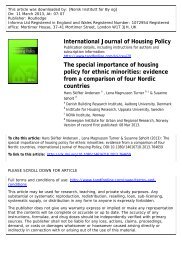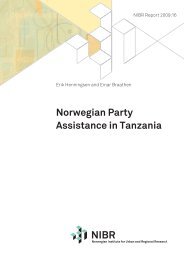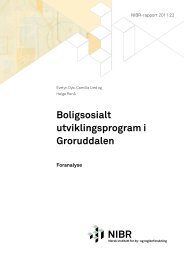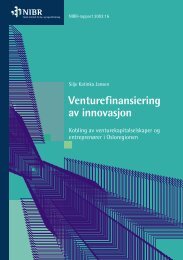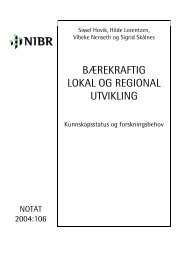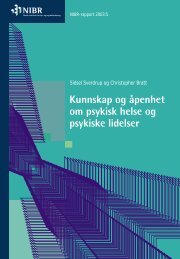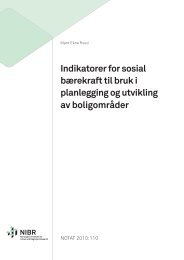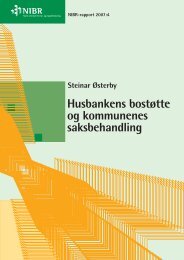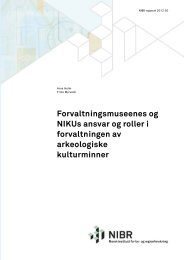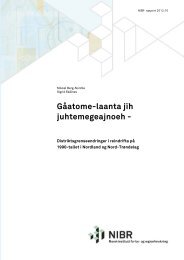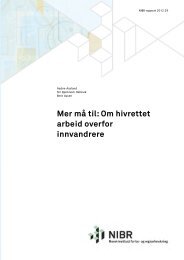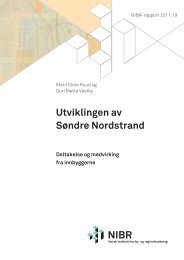Bangladesh Mahila Parishad - Norad
Bangladesh Mahila Parishad - Norad
Bangladesh Mahila Parishad - Norad
- No tags were found...
Create successful ePaper yourself
Turn your PDF publications into a flip-book with our unique Google optimized e-Paper software.
society space to advance women’s issues and human rights. The media has also givenconsiderable attention to issues raised by civil society organisations, and many arevisible in the media.Most organizations in the human rights and development field are donor funded andrely on paid staff. BMP has been an exception in that it has relied mainly onvolunteers and donations from <strong>Bangladesh</strong>i philanthropists. However, the conditionsfor volunteerism and philanthropy appear to have become more difficult as timepressure on professionals – and potential volunteers – have increased, and fewerphilanthropists come forward, according to observers. Some interviewees haveargued that the culture of volunteerism is disappearing. These developments havemade conditions tougher for organizations such as BMP.The government consults in a participatory and formalized way with civil societyorganizations in policy and law formulation. This was the case for example in thepolicy process leading up to the adoption of the law on domestic violence in 2010.The government also enlists the services of NGOs in service delivery and for trainingpurposes. The present government in <strong>Bangladesh</strong> has according to the Minister forWomen and Children Affairs, Dr. Shirin Sharmin Chowdhury, given priority toworking on economic empowerment, especially establishing safety nets for the ultrapoor, but they have also introduced measures to support women entrepreneurs,handicraft development, women working in the garment sector etc. Maternal andchild mortality as well as gender parity in education, with a special focus on drop-outrates, have been other priority areas for the government.Despite huge progress, <strong>Bangladesh</strong> still has a relatively high rate of illiteracy,religiously sanctioned patriarchy is strong, fundamentalist groups are vocal, and thelimits on what is socially acceptable are strict. On paper, the government is prowomenand did for example support the idea of reserved seats for directrepresentation of women to Parliament before the elections. However, observers saythe government is worried about losing support of ordinary people if it comes out aspro-women’s rights. These are the social and political realities in which women’sorganizations in <strong>Bangladesh</strong> are embedded.The Norwegian Embassy has supported BMP since 1994. From 2008 the NorwegianEmbassy in Dhaka scaled back its staff, and reduced the number of developmentpartners. Gender was retained as one of its focus areas, and the Embassy increasedits support to BMP, identifying BMP as one of its chosen development partners. In asimilar process, the Danish Embassy reduced its number of partners and scaled upsupport for those selected. BMP was selected after careful assessment of thecapacity of several civil society organizations, and was the only women’s organizationto receive support. Danish support is provided under the Embassy’s Human Rightsand Good Governance Programme. Both donors would like to see BMP as a leadingand visible women’s organization in <strong>Bangladesh</strong>. As for BMP they have beencautious in approaching funding agencies and have sought like-minded partners.Whereas Norwegian funding is intended to strengthen BMP activities in a number ofareas, the new Danish support is intended to support BMP’s work to strengthenwomen’s role in local government. This area is seen as critical by BMP in order to13



